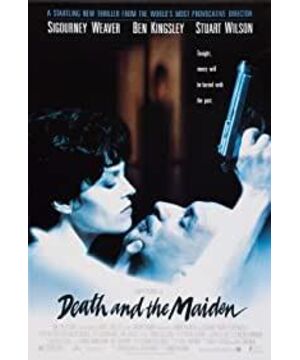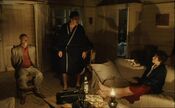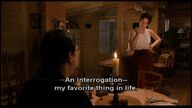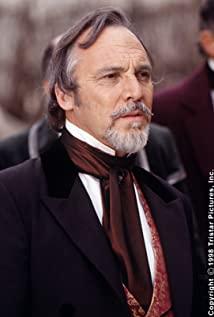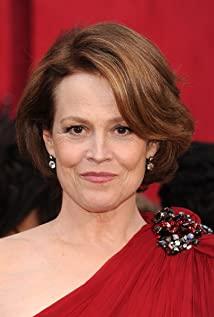Private record.
Single scene, three actors. Promote well. The plot sounds dramatic, but the presentation is extremely natural, with climaxes.
The wife is alone—husband and wife—three of whom are separated occasionally.
Set in a post-war South American country, the wife and husband were comrades during the revolution. The husband was an editor of the Liberation newspaper. The wife collected anonymous articles for her husband. Once caught by the secret police, she was electrocuted, tortured, raped, gang-raped, and released. Scarred from time to time. Nervous and frightened.
At the beginning of the story, on a stormy night, there was a power outage, the tire of the car broke, and the husband took the doctor's car back. (The setting is very dramatic, but the story is very complete.) The husband is being appointed as the chairman of the Human Rights Committee. During the stormy night, the wife was desperate and screamed, knowing that he was "to clean up those people's crimes", repeating "I I hate lying!". She demanded the truth and confession. During the period, they didn't cooperate, put the food into the trash can, and escaped by themselves. The last two of them had sex and stopped briefly, which also paved the way for the heroine to let the doctor go behind.
The wife said that she knew that her husband was very empty and wanted to make him perfect and important. It can be seen that she loves him, and her contribution is also tangible. The husband’s love is very passive and submissive. One is that she will find another love after death; the other is that she will marry her after she is released; the third is that she is required to defend the doctor and the procedure is fair (whether the doctor is a bad person is an important suspense point later. ), and the fourth is that the doctor still couldn't push off the cliff after speaking.
No matter whether the doctor is that person or not, his attitude at the time could not show that his love for the heroine was the kind she wanted. It was more out of sympathy, what he thought of repaying favor, and his own request. The heroine obviously paid more. The husband said he was a fake gentleman and a hypocrite. He couldn't make a trial in the end, and he took care of the front. (He is so hypocritical!)
The wife's confession. "I want to live", "live until then, to witness a bright future." The heroine is the most dramatic, traumatized, neurotic, and also rounded back.
The doctor's cliff exposition is very good. The torture process. Knowing the truth, he finally knelt down and untied.
Attempting to rescue, blood flowed into the eyes, untied, went to the toilet, the phone rang, the call rang, the music rang, and the identity was verified. During the period, the two people talked and narrated many times.
Guns, knives.
Finally the three people meet in the concert hall, and the heroine once said that I want to adopt a child, a beautiful boy. A boy was sitting beside the doctor.
Other interpretations. One said that the doctor's confession was his imagination, either innocently imagined or had similar experiences. One is the sexual fantasies of the concert hall doctor/male and female protagonist. I don't think the trustworthiness is great, and it doesn't make sense to sit in suspense.
Struggling to confirm, pulling out the truth is more interesting.
The doctor acted very well.
————————
Excerpt from the comment area:
1. The game between procedural justice and substantive justice (slide into terrorism). The struggle between justice and morality,
2. Space scheduling, layer by layer.
3. "In a democratic country, there is no danger of knocking on the door in the middle of the night." The deep expansion brought about by the political background.
4. "At first I wanted to rape him, so that he could feel the pain of being raped, but I am a woman, so I can't do this, so I want you to rape him, but I also consider that you may not want to, and it takes time. Getting excited or something, so I want to stab him with a broomstick, okay?"
"We can never fully own the soul of a woman", I don’t know what this means-you really want to really occupy their hearts, no matter how much it will cost, you will pay without hesitation, but you Still can't get what you want, what do we want?-Their acknowledgment. So what did we get? ....... Guilt? ”
Guilt vs. sex.
5. Power, abuse and abuse. (I feel that this point is too boring, annoying, too curious...)
View more about Death and the Maiden reviews


